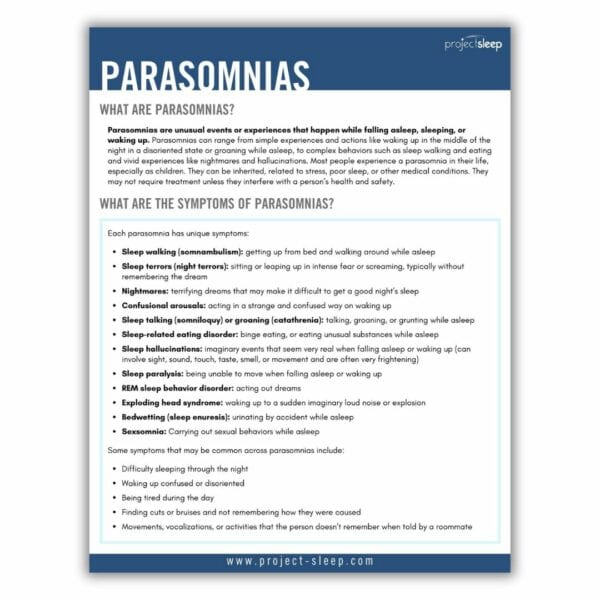Parasomnias are unusual events or experiences that happen while falling asleep, sleeping, or waking up.
Parasomnias
What are parasomnias?
Parasomnias can range from simple experiences and actions like waking up in the middle of the night in a disoriented state or groaning while asleep, to complex behaviors such as sleep walking and eating, and vivid experiences like nightmares and hallucinations.
Most people experience a parasomnia in their life, especially as children. They can be inherited, related to stress, poor sleep, or other medical conditions. They may not require treatment unless they interfere with a person’s health and safety.
What are the symptoms of parasomnias?
Some symptoms that may be common across parasomnias include:
- Difficulty sleeping through the night
- Waking up confused or disoriented
- Being tired during the day
- Finding cuts or bruises and not remembering how they were caused
- Movements, vocalizations, or activities that the person doesn’t remember when told by a roommate
Types of Parasomnias
Each parasomnia has unique symptoms:
Sleep walking (somnambulism): getting up from bed and walking around while asleep
Sleep terrors (night terrors): sitting or leaping up in intense fear or screaming, typically without remembering the dream
Nightmares: terrifying dreams that may make it difficult to get a good night’s sleep
Confusional arousals: acting in a strange and confused way on waking up
Sleep talking (somniloquy) or groaning (catathrenia): talking, groaning, or grunting while asleep
Sleep-related eating disorder: binge eating, or eating unusual substances while asleep
Sleep hallucinations: imaginary events that seem very real when falling asleep or waking up (can involve sight, sound, touch, taste, smell, or movement and are often very frightening)
REM sleep behavior disorder (RBD): acting out dreams
Exploding head syndrome: waking up to a sudden imaginary loud noise or explosion.
Bedwetting (sleep enuresis): urinating by accident while asleep.
Sexsomnia: Carrying out sexual behaviors while asleep.
How are parasomnias diagnosed?
Seeing a sleep specialist and/or neurologist is recommended for anyone who may be experiencing one or more parasomnias.
A sleep specialist will ask questions about your symptoms and sleep, ideally with the help of a partner or roommate who has witnessed the behavior, if available. They will also do a physical and neurological exam.
The sleep specialist may ask patients to track their sleep and wake patterns for several days or weeks by keeping a sleep diary and/or wearing an actigraph (a medical device that looks like a smartwatch). To diagnose a parasomnia and to check for other sleep disorders, an overnight sleep study (also called polysomnography) may be done in a sleep center/lab. It uses video and stick-on sensors to monitor body movements, brain activity, breathing, and heart rate.
Some specialists may also request a multiple sleep latency test, which measures how a person sleeps during the day after an overnight sleep study. For this test, the person is asked to nap for around 20 minutes every 2 hours.
How are parasomnias treated?
Parasomnias may not need treatment, especially in children, unless they are frequent or could result in injury. The best choice of treatments for each person depends on the type and cause of parasomnia.
Depending on the parasomnia, helpful lifestyle strategies could include safety measures (e.g., padding hard furniture, storing knives securely, locking windows or cupboards), avoiding caffeine and alcohol in the evening, and developing healthy sleep habits.
Treating other health conditions, including sleep disorders and mental health issues that could be contributing to symptoms. In some cases, certain medications may provoke parasomnias, so stopping those medications may be the appropriate treatment.
Behavioral therapies, including education, counseling, and cognitive behavioral therapy, can help with keeping healthy sleep habits and treating related mental health conditions.
Connecting with other people who have parasomnia and their families can empower people to learn helpful strategies for living well. It can be helpful for parents or roommates to learn how to react when a person is experiencing parasomnia symptoms.
Medications used to treat parasomnias in adults include benzodiazepines, tricyclic antidepressants, alpha blockers, and melatonin.
Resources for People with Parasomnias
Please also download our free, printable Parasomnias Fact Sheet for a handy resource to share with friends, family, and medical providers.

